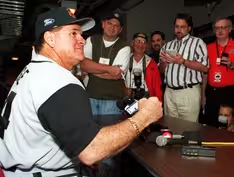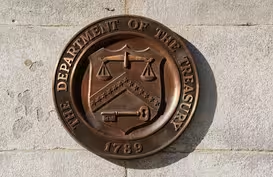
Minnesota works to address disappearances of Black women
Clip: 5/13/2025 | 7m 18sVideo has Closed Captions
Minnesota works to address murders and disappearances of Black women
Despite making up 15 percent of the female population, almost 40 percent of the women and girls reported missing last year were Black. Despite national pressure to abandon programs addressing disparities, an effort in Minnesota is exploring the problem and finding solutions. Special correspondent Fred de Sam Lazaro reports for our series, Race Matters.
Problems playing video? | Closed Captioning Feedback
Problems playing video? | Closed Captioning Feedback
Major corporate funding for the PBS News Hour is provided by BDO, BNSF, Consumer Cellular, American Cruise Lines, and Raymond James. Funding for the PBS NewsHour Weekend is provided by...

Minnesota works to address disappearances of Black women
Clip: 5/13/2025 | 7m 18sVideo has Closed Captions
Despite making up 15 percent of the female population, almost 40 percent of the women and girls reported missing last year were Black. Despite national pressure to abandon programs addressing disparities, an effort in Minnesota is exploring the problem and finding solutions. Special correspondent Fred de Sam Lazaro reports for our series, Race Matters.
Problems playing video? | Closed Captioning Feedback
How to Watch PBS News Hour
PBS News Hour is available to stream on pbs.org and the free PBS App, available on iPhone, Apple TV, Android TV, Android smartphones, Amazon Fire TV, Amazon Fire Tablet, Roku, Samsung Smart TV, and Vizio.
Providing Support for PBS.org
Learn Moreabout PBS online sponsorshipGEOFF BENNETT: Amid that broad national push against DEI, a report now on one state's effort to close a significant racial gap in this country, the disproportionate rate at which Black women and girls are murdered or go missing.
AMNA NAWAZ: Special correspondent Fred de Sam Lazaro has this story from Minnesota, part of our series Race Matters.
LAKEISHA LEE, Sister of Brittany Clardy: All the times that I miss my sister and want her included in different things that are happening throughout our family, we always come here.
Her niece and nephew have came and shown their Halloween costumes.
I just miss her so much.
FRED DE SAM LAZARO: Not a day goes by that Lakeisha Lee think about her sister.
LAKEISHA LEE: She was a caretaker.
She was natural nurturer.
FRED DE SAM LAZARO: Brittany Clardy as just 18 years old when she went missing in 2013.
She went to a store in her family's St. Paul neighborhood and didn't return.
LAKEISHA LEE: We knew something was wrong right away because she wasn't someone who didn't talk with our family and didn't stay in touch.
FRED DE SAM LAZARO: Lee and her family went to the police, who told them to call back after 24 hours.
LAKEISHA LEE: They told us, oh, she could possibly have ran away with her boyfriend to Chicago.
And I'm just like, no, that's not the case here.
We know she's missing and something's wrong.
It was really disheartening that we weren't heard at that time.
FRED DE SAM LAZARO: Ten days later, they got word that Clardy's car had been brought to an impound lot.
She was found murdered inside.
LAKEISHA LEE: It was like our whole world was turned upside down.
FRED DE SAM LAZARO: To make matters worse, headlines about Clardy's murder referred to her only as a prostitute.
She met her killer after he responded to her ad for sexual services.
LAKEISHA LEE: Instead of her being a young girl who was coerced into doing some things that she shouldn't have been doing, they reported that she was a prostitute.
They didn't report the -- how she got there.
They just reported a label.
That was probably the most disturbing piece of the process when it first happened.
FRED DE SAM LAZARO: The reactions from both law enforcement and the public spurred Lee to action.
She worked with community groups, launched a foundation and helped start Brittany's Place, a shelter for sex trafficking victims.
LAKEISHA LEE: My name is Lakeisha Lee.
FRED DE SAM LAZARO: And she met with lawmakers.
Years after Clardy's murder, the Minnesota legislature created a task force to study the issue of missing and murdered Black women and girls.
Its findings were stark, but perhaps not surprising in a state with some of the highest racial disparities in the country.
According to data released by the task force, Black women are nearly three times more likely to be murdered in Minnesota than white women.
Black women make up only 7 percent of the state's population, but 40 percent of its domestic violence victims.
And the inequity is mirrored nationally.
Despite making up just 12 percent of American females, almost 40 percent of the women and girls reported missing last year were Black.
Lee was one of the chairs of the state task force.
WOMAN: To ensure that Brittany's memory is honored.
FRED DE SAM LAZARO: And in 2023, thanks partly to her lobbying, the state legislature voted to create the nation's first office dedicated to missing and murdered Black women and girls.
Last April, the office got its first director, Kaleena Burkes.
She spent almost seven years working for Minnesota's Guardian ad Litem Board, which protects children in court cases.
KALEENA BURKES, Director, Minnesota Office for Missing and Murdered Black Women and Girls: We need media and law enforcement and victim services agencies to give the same level of urgency and priority to these cases that they haven't typically gotten.
You need someone that's outside of law enforcement in order to bridge the gap with the community.
I would argue that, as soon as the case is reported to the police, that community, victims, families, relatives, they should come to us next.
We will have an intake process.
FRED DE SAM LAZARO: When a case is reported, Burkes says the office can guide families through police investigations, help with missing person fliers and provide victim services like mental health support.
It will also train law enforcement and collect data.
The state's largest law enforcement association declined to comment.
KALEENA BURKES: This is not just about policy.
This is about lives.
FRED DE SAM LAZARO: And, Burkes says, the office will raise awareness with events like the inaugural Missing and Murdered Black Women and Girls Day on the Hill last month.
LAKEISHA LEE: When Black women and girls are safe,all of our communities are safe.
The power of our united voices and tireless advocacy can and will create a future where every person is seen, heard, and protected.
FRED DE SAM LAZARO: But the state office isn't fully staffed yet, and it's only working on one case.
At the end of last year, there were over 1200 active cases of missing Black women or girls in Minnesota.
KALEENA BURKES: I would argue that the reason we don't have more is because the community is unaware that we're out there.
The more we get out in community and have the tough conversations and explain the process, that the understanding comes.
But the truth is, we want urgency around some of this.
And so we do have to meet the community where they are.
FRED DE SAM LAZARO: But there are other potential headwinds now.
Lee worries about funding cuts trickling down to organizations like Brittany's Place and about the broad push led by the Trump administration against programs fighting racial disparities.
LAKEISHA LEE: DEI programs getting cut, no mention of the epidemic that's happening of Black femicide in the U.S., and a whole political body that wants to remove that, that does not want to celebrate how far we have come and does not want to invest in where we need to move forward, that's difficult.
FRED DE SAM LAZARO: Minnesota Representative Ilhan Omar introduced legislation named after Brittany Clardy to create a national Office for Missing and Murdered Black women and Girls, but it stalled in the House.
And Lee met late last year with Department of Justice officials about the crisis, but she says she's heard nothing since.
Still, multiple states have reached out to Minnesota about opening their own offices.
And, for Lee, there's another measure of success.
LAKEISHA LEE: I know she would be really proud of me.
My sister's life meant so much, not just to Black women and girls who have gone missing, but just how Black women are seen in society.
That's a big deal.
That's the big deal.
FRED DE SAM LAZARO: For the "PBS News Hour," I'm Fred de Sam Lazaro in St. Paul, Minnesota.
GEOFF BENNETT: Fred's reporting is a partnership with the Under-Told Stories Project at the University of St. Thomas in Minnesota.
Baseball reinstates Pete Rose and Shoeless Joe Jackson
Video has Closed Captions
Clip: 5/13/2025 | 5m 28s | Baseball reinstates Pete Rose and Shoeless Joe Jackson, making them Hall of Fame eligible (5m 28s)
Family reflects on 1950s U.S. deportation effort
Video has Closed Captions
Clip: 5/13/2025 | 3m 7s | Family who lived through 1950s U.S. deportation effort reflects on current climate (3m 7s)
Mideast experts weigh in on Trump's economic, defense deals
Video has Closed Captions
Clip: 5/13/2025 | 9m 5s | Mideast experts weigh in on Trump's economic and defense deals in the region (9m 5s)
Students face changes as Ohio law rolls back DEI initiatives
Video has Closed Captions
Clip: 5/13/2025 | 9m 22s | Ohio students face changes on campus as new state law rolls back diversity initiatives (9m 22s)
Trump sets new course for American policy in Middle East
Video has Closed Captions
Clip: 5/13/2025 | 4m 43s | Trump arrives in Saudi Arabia as he sets new course for American policy in Middle East (4m 43s)
What trouble in the bond market means for your investments
Video has Closed Captions
Clip: 5/13/2025 | 7m 22s | What trouble in the bond market means for your investments and the economy (7m 22s)
Providing Support for PBS.org
Learn Moreabout PBS online sponsorship
- News and Public Affairs

FRONTLINE is investigative journalism that questions, explains and changes our world.

- News and Public Affairs

Amanpour and Company features conversations with leaders and decision makers.












Support for PBS provided by:
Major corporate funding for the PBS News Hour is provided by BDO, BNSF, Consumer Cellular, American Cruise Lines, and Raymond James. Funding for the PBS NewsHour Weekend is provided by...





